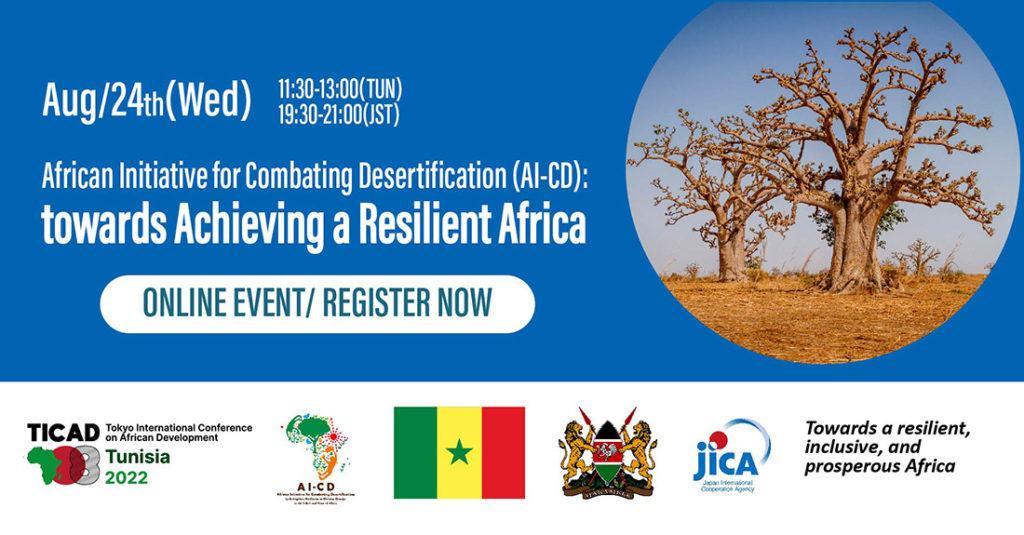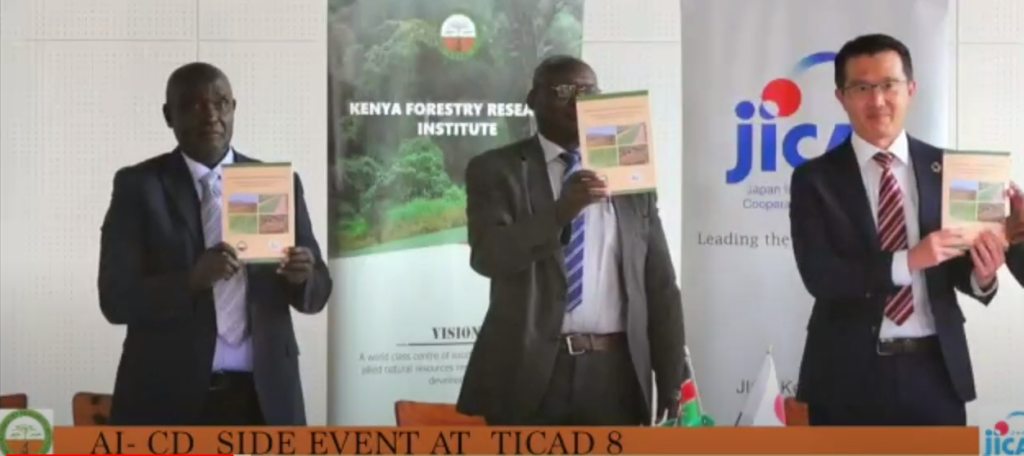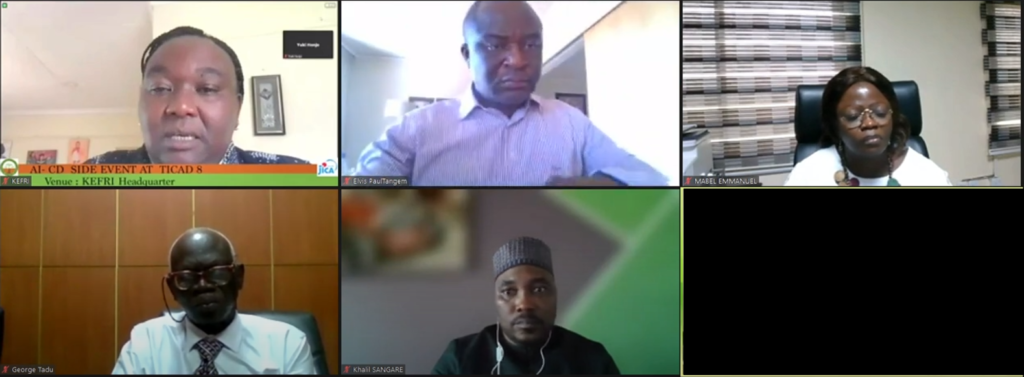An AI-CD culminating event hosted by Japan International Cooperation Agency (JICA), the Ministry of Environment and Forestry (MoEF) of Kenya and the Ministry of Environment and Sustainable Development (MESD) of Senegal was held online on August 24, 2022 as a side event of the 8th Tokyo International Conference on African Development (TICAD 8).
The event was attended by 101 participants and comprised mainly of African countries, AI-CD Focal Points, and development partners.
The purpose of the side event was to share the achievements of AI-CD over the past six years and discuss ways to make countries in the Sahel and the Horn of Africa (HoA) region resilient to climate change by promoting measures for combating desertification.
The participants shared all the achievements of AI-CD in terms of Networking, Knowledge Sharing, and Access to Finance. They also provided the way forward such as considering how to continue the collaboration within AI-CD countries and elaboration of bankable projects that meet the requirements of funders. In addition, it was suggested by one of the panelists that the more effective way is to stop sectorial operations and develop synergies by cooperation of all stakeholders to combat desertification.
Finally, the side event was concluded as confirmation of strengthening partnerships among African countries, development partners, and international organisations to combat desertification.
AI-CD was officially concluded at this side event as planned by completing its planned activities that commenced at the AI-CD’s launching during TICAD VI.

Highlights of the Event:
SESSION 1: Opening ceremony
Mr. ONODERA Seiichi, Senior Vice President of JICA, thanked the participants for attending the event in his welcome remarks. He magnified the strong leadership of Kenya and Senegal during the past six years and explained that this event is an opportunity to exchange views toward the achievement of the SDGs by 2030
Mr. Alfred Gichu, Forest Conservation Secretary appreciated the support of JICA on behalf of the Minister of Environment and Forestry, Kenya and pointed out that the objective of this side-event is to draw lessons and opportunities from AI-CD achievements in order to help Africa reach global development.
Mr. Dominique Manga, Chief of the Forests Protection Division delivered keynote speech on behalf of Minister of Environment and Sustainable Development, Senegal, focusing on the fact that land degradation and desertification are the biggest challenges in Africa and underlined the gratitude of the Senegalese people toward JICA for its technical and financial support.
Dr. Joshua Cheboiwo, Director of Kenya Forestry Research Institute (KEFRI), presented the book Drylands Forestry Research and Development in Kenya based on 37 years of cooperation between KEFRI and JICA. He emphasised the fact that the book was written primarily to record research and development, and share technologies, techniques and case studies concerning drylands that cover 80% of Kenyan area. At the end of his discussion, he handed a copy of the book to the Chief Representative of JICA Kenya Office.

Copy of the book Drylands Forestry Research and Development in Kenya was handed to the Chief Representative of JICA Kenya Office
SESSION 2: Sharing AI-CD achievements and discuss way forward
This session was dedicated to the sharing of AI-CD achievements over the past six years and discussing ways to make countries in the Sahel and the HoA region resilient to climate change by promoting measures for combating desertification.
Dr. Musingo Mbuvi (Forest Research Support Service of KEFRI, Kenya), on behalf of the HoA countries, presented the AI-CD achievements from 2016 to 2022. He pointed out that holding Regional Forums and National Workshops (Sudan, South Sudan) is one of the achievements of Networking. For Access to Finance, he mentioned that creating Project Concept Notes (PCN) and facilitation to identify funding opportunities for Focal Points are the important achievements. As to way forward, he emphasised the necessity to consider continued collaboration within the HoA countries and Sahel region. Finally, he suggested to establish issue-based networks for knowledge sharing, undertaking needs assessment and capacity building based on the needs assessment.
Mr. Baba Ba (Ministry of Environment and Sustainable Development, Senegal), on behalf of the Sahel region countries, emphasised the holding of Regional Forums and National Workshops (Burkina Faso, Mali, Senegal and Nigeria) as achievements in terms of Networking. While on Knowledge Sharing, the following were highlighted: (1) holding Knowledge Sharing Seminar on techniques and technologies to tackle desertification in collaboration with CLISS, and (2) creating short films in Nigeria and Mali to present each country’s activity related to AI-CD and combating desertification, (3) preparing Knowledge and Policy Brief which elaborated strategies and mechanisms to implement Access to Finance. He pointed out that Nigeria and Mali submitted their respective initiatives for funding, and the proposal from Mali was accepted by FAO, as an important achievement of Access to Finance. As way forward, he emphasised that elaboration of bankable projects that meet the requirements of funders is necessary.
Mr. Takuya Shiraishi from AI-CD Secretariat presented the AI-CD cross-regional achievements. As achievements in Knowledge Sharing, he pointed out the (1) establishment and maintenance of the AI-CD website and SNS pages, and the (2) database collaboration with ICARDA (http://aicd-africa.org/knowledge). As for Access to Finance, he emphasised the importance of involvement of the private sector through the promotion of new technologies such as biodegradable tube and soil conditioner using used glasses. He reiterated as way forward for AI-CD countries the enhancement of country initiatives to develop and implement projects based on networks, capacity, and opportunities developed through AI-CD and other initiatives. He also stressed the need for AI-CD partners to further their efforts on (1) enhancing global/regional initiatives’ harmonisation to support countries effectively, (2) maintaining and enhancing partnerships and dialogues between countries and partners, and among domestic key stakeholders in each country, (3) strengthening in-county coordination for promoting measures to combat desertification effectively.
SESSION 3: Panel Discussion
Dr. Lucy Ng’ang’a, Deputy Director, Multilateral Environment Agreements, Ministry of Environment and Forestry of Kenya, the Moderator, explained the purpose of the panel discussion and introduced the three topics below.
- What achievements have been made through AI-CD and were there any challenges during their implementation?
- What are the recent movements and future directions /strategies of global initiatives, such as those by the Great Green Wall and other relevant organisations, in fighting desertification and climate change?
- What is the way forward for the Sahel and the Horn of Africa countries to accelerate their efforts in combating desertification and strengthening resilience to climate change?
First Topic
Dr. George Louise Tokporo Tadu (Senior Research Scientist, Head of Root and Horticultural Crops Research, Ministry of Agriculture and Food Security, South Sudan) elaborated the link that his country has with the HoA regional hub that led to a training at KEFRI on community nursery establishment, development of proposals, restoration of degraded land, and land planning.
Ms. Mabel Emmanuel (Director, Desertification, Land Degradation and Drought Management, Federal Ministry of Environment, Nigeria) said that AI-CD is a positive programme for the campaign against desertification, and Nigeria benefitted widely from it. In terms of achievements in Networking, she talked about the two national workshops, in April 2019 and November 2021, which led to the delivery of two very informative technical papers by university experts. For Knowledge Sharing, she mentioned the short film produced about desertification in Nigeria.
Second Topic
Dr. Elvis Paul (Coordinator, Great Green Wall (GGW) for the Sahara and Sahel Initiative, African Union) pointed out that AI-CD, GGW, and other organisations that fight desertification, should change their existing modus operandi and put the focus on actions. Moreover, he emphasised that it is necessary to stop sectorial operations, bring all together initiatives and activities and develop synergies for more effectiveness.
Dr. Sheick Khalil Sangaré (Acting Chief of Department of Studies and Researches in Agriculture, Environment and Markets, The Sahel Institute (INSAH/CILSS)) informed the participants that their activities have been mainly based on resource mobilisation and regional structuring of project implementation related to desertification and land degradation in terms of technical transfer, capacity building and sustainable development.
Third Topic
Dr. Tadu cited the following three points: (1) Synergy between private sector and government, (2) Development of bankable projects to attract funders, and (3) Raise awareness on climate change and land degradation.
Ms. Mabel said that it is necessary to (1 )engage development partners and private sector to the restoration programmes of the country, (2)create leverage on networking and knowledge sharing amongst key government agencies involved in restoration activities and (3) set up a platform to coordinate all restoration activities.
Dr. Sangaré suggested making AI-CD better known, promote national level policies, make various means available and evaluate various outcomes. He also talked about the need to move towards innovative financing and implement a strategy of mobilising technical resources.
Dr. Elvis encouraged the development of synergies between organisations which have similar goals. He then expressed his willingness to request GEF, GCF and other funders to improve their funding procedure so that African countries will be able to receive enough funds.

Panelists of the Side Event
SESSION 4: Closing ceremony
Mr. Takashi Nishimura, Deputy Director General, Global Environment Department, JICA, finally concluded the side event by emphasising his strong will to strengthen partnerships with African countries, development partners, and international organisations to combat desertification.

